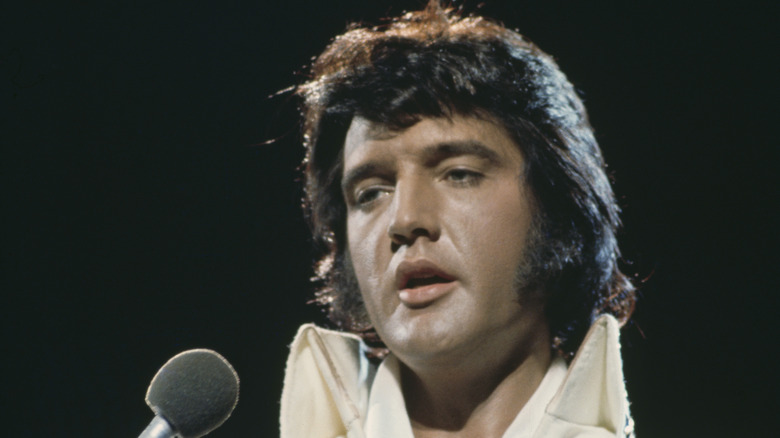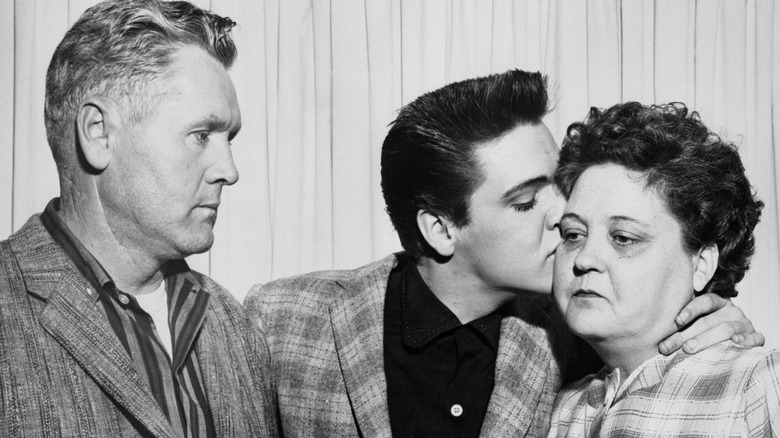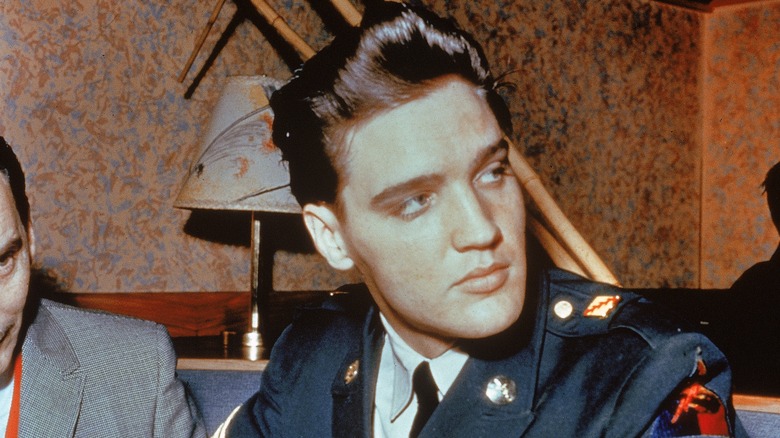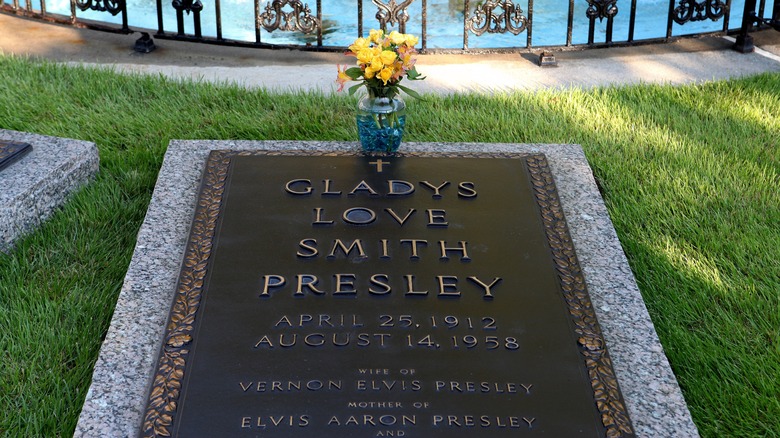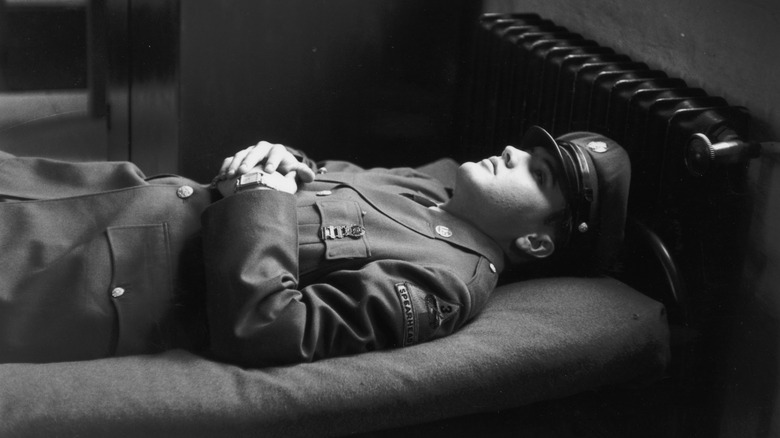The Most Tragic Detail About Elvis Everyone Forgets
Of all the women in Elvis Presley's life, from groupies to girlfriends, his ex-wife, and his daughter, none held the kind of sway over him as did his beloved mama, Gladys Presley. Though impoverished, she poured herself into raising her only son, and in turn, his devotion to her was complete and obvious to everyone around them. But as much as Gladys wanted to keep her precious boy safe from the dangers of the world, her own personal coping mechanisms may have set the stage for Elvis' long decline into drug abuse.
Presley famously grew up an only child in Tupelo, Mississippi. His dad, Vernon, often traveled looking for work and once spent eight months in jail for check forgery when Elvis was 3 years old. Vernon's absences meant Gladys and Elvis were alone together a lot, sleeping in the same bed and speaking in their own secret baby language. Though Elvis was the only child, he had a stillborn twin. That loss is said to have made Gladys ever more doting and protective.
As a woman who spent much of her life in rural settings with her son under her wing, she encouraged him to pursue his music and yearnings to be a performer. Yet, according to the book "Being Elvis: a Lonely Life," by Ray Connolly, Gladys struggled as she watched Elvis' star quickly rise. She was losing her boy to the world and it caused her deep anxiety and a longing for simpler times. Her way of dealing with the changes that were out of her control was to take "slimming pills" aka amphetamines, and "drinking a little on the quiet."
Gladys self-medicated to deal with Elvis' success
As a mother who had always kept her son close, one of the things Gladys disliked the most about Elvis' success was that he often had to travel, and to her mind, the world was a dangerous place. But dutiful son he was, Elvis would call his mama every night, per "Being Elvis." Yet Elvis was already on the trajectory that would seal his fate as the King of Rock 'N' Roll. The speed at which it all happened unsettled Gladys. "... all the time Gladys was feeling worse with her 'nerves,'" Connolly wrote. "Her son's career had now taken over all their lives."
In the three years from when Elvis contracted with RCA in 1955 until he was drafted into the U.S. army in 1958, he had seen 10 of his songs reach the top spot on Billboard, and he'd sold millions of records — enough to buy his beloved home Graceland in 1957 where he immediately moved his parents in to live with him. By then Gladys wasn't coping well. She was drinking vodka regularly, denying it was a problem, and being defensive about it. She was also still taking amphetamines to try to lose weight.
Then, just before Christmas that year, Elvis learned he'd been drafted into the U.S. armed forces for two years. He was slated to leave for the army in March 1958. The news deflated Gladys. She's described in "Being Elvis," as "close to tears most of the time," and putting around Graceland in slippers and a housecoat.
1958 was a pivotal year for Elvis
Ironically, as Gladys' life was coming to an end hastened by substance abuse in 1958, Elvis would soon turn to pills as a means of enduring a variety of emotional and physical symptoms. Being drafted ripped him from the midst of massive success pioneering a new sound of popular music, boosted by his good looks and trademark moves that made teenage girls swoon and mothers clutch their pearls. What's worse, Presley's abrupt life change at the orders of the U.S. government would become the catalyst for a lifetime of drug abuse and addiction that dimmed the star that once shone so bright. Though Presley was only in the army for two years, it was enough time to develop a dependency on prescription pills that were given to him by his superiors, which was not unusual in the military as far back as World War II.
While stationed in Germany, he met his ex-wife Priscilla Presley. While reports exist of Elvis using amphetamines for energy for performances during tours prior to being drafted, Priscilla told People in 2018 that it was legitimized while he was in the army. "That was the thing — they gave them to the soldiers over there to keep them awake," Priscilla said. "He was on guard at that time. He had maneuvers that he had to do late at night, so the pills were given to the guys and that's how he started. And if you take a sleeping pill, you have to do something to get yourself awake. ... He was in unchartered territory, he truly was, and he did this and tried to do this alone."
Gladys had severe liver damage when she died
Over the years, Elvis' drug use continued to escalate under the illusion that since the drugs he took were prescribed by a doctor, his abundant usage was not in the same league as those who abuse illicit drugs or alcohol. In his youth, Presley's mother, Gladys, "lectured him ... stringently about the pitfalls of alcohol per Elaine Dundy's "Gladys and Elvis," yet she herself abused alcohol to the point that it became a major factor in her death, according to the book.
Gladys, who sought to protect her beautiful boy from the scourge of alcoholism developed acute hepatitis and severe liver damage causing her to be hospitalized in August 1958. She died there just days later. Though there was no autopsy at the behest of Elvis and Vernon, it's said she died of a heart attack at the age of 46. Gladys' railing against alcohol worked though — Elvis wasn't a drinker and didn't like being around drunk people, but as we know, alcohol isn't the only intoxicant by which to die young.
Elvis was 23 when Gladys died, and by all accounts he was inconsolable. "Gladys and Elvis" describes a heart-wrenching scene in which Elvis "flung himself at his mother in his coffin, hugging and kissing her, rocking her back and forth, weeping endearments and crying out to her in their own special language to come back to him." He had lost his moorings.
Elvis' death was tied to his drug addiction
As much as Gladys Presley loved her son and sought to protect him, she was unable to teach him healthy coping mechanisms; she didn't possess them herself. After the loss of Gladys, Elvis had to return to his military assignment in Germany. Far from home, away from the support of family and friends, and having to put a pin in the dreams he'd realized, it's not a huge leap to imagine him wanting to change his head space. After all, Gladys took pills regularly, plus his superior officers supplied them, so there was no stigma like there was with alcohol.
Elvis' life after coming back from the States is well-documented. He married and divorced Priscilla and they had a daughter, Lisa Marie. He still made music but under the thumb of manager "Colonel" Tom Parker, a lot of his energy was put into making dozens of feature films. Rock music and the times were changing throughout the 1960s and into the 70s, and though Elvis was an early influence the genre, he'd evolved into an often ridiculed Vegas act. The Elvis era had ended.
Through it all, he used a cornucopia of prescription drugs to deal with his struggles, stuck in a cycle of poor health compounded by the drug use. He died in August 1977 of a heart attack. That year alone, Elvis' personal physician had written him 199 prescriptions for "more than 10,000 doses of sedatives, amphetamines, and narcotics" according to The Guardian. Per FHE Health, 10 prescription drugs were found in Elvis' system after he died, mostly a combination of painkillers, anti-anxiety medications, and sedatives.
